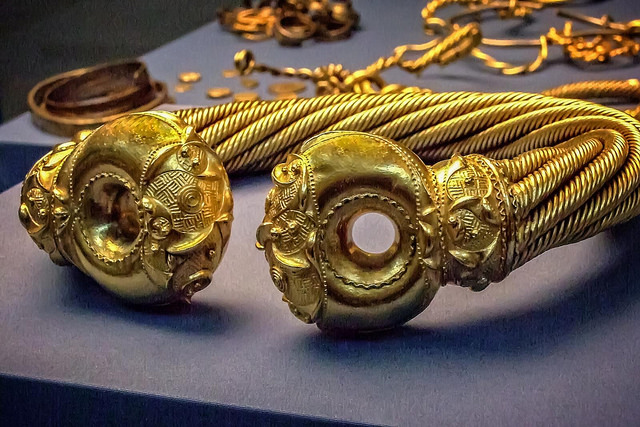
As Anthony Riches' third novel in his "Empire" series begins, we find our protagonist Marcus, now known as Marcus Tribulus Corvus, preparing to attack the fortified encampment of the (fictional) rebel Selgovae chieftain, Calgus, and his warriors and allies, the fiercesome Venicones. The Romans succeed in devastating the Selgovae at the encampment but with terrible losses including one of Marcus' own brother centurions. To make matters worse, Calgus is spirited away by the Venicones, although now he is their captive, no longer their war leader. However, before his loss of power, Calgus dispatched a contingent of Selgovae to take over the Votadini capital, the daunting "Fortress of Spears" of this installment's title, and the Romans must now plan an even more dangerous assault to finally rid themselves of the last of the rebellious Selgovae and return the Votadini to their previous status as Roman allies.
Fortunately, the Votadini Prince, Martos, captured by the Romans in book 2, now shares their cause and harbors nothing but hatred for Calgus and the Selgovae who so ruthlessly betrayed him. Martos will prove invaluable in the ultimate attack on the "Fortress of Spears". But capturing the fortress is not the only obstacle to Roman victory. The Venicones king discovers the Romans have his treasured torc, found when the original encampment was seized, and vows to take it back or die gloriously in the attempt.
 |
| Celt Neck-Ring known as the Snettisham Great Torc Iron Age 150 BCE - 50 BCE Electrum photographed at the British Museum by Mary Harrsch © 2008 |
Meanwhile, unbeknownst to Marcus, the corrupt Praetorian Prefect in Rome, Sextus Tigidius Perennis, has dispatched a Praetorian assassin and a "corn" officer to hunt down Marcus, the last surviving son of a proscribed senatorial family. Perennis' son, the villain of book 1, betrayed Marcus' biological father's Sixth Legion to engineer a promotion and accolades from the vile emperor Commodus. The younger Perennis' treachery was, as is often the case with wealthy, powerful men, covered up by the military. So, the elder Perennis mistakenly believes Marcus killed his son and is being protected by an auxiliary unit of Tungrians serving on Hadrian's Wall.
In the novel, the Praetorian assassin holds a rank equivalent to a centurion but I was confused about the presence of a "corn" officer. However, if you read up on the importance of those charged with supervision of the Roman grain supply, it becomes quickly apparent that such officers carried quite a bit of clout.
"In classical antiquity, the grain supply to the city of Rome could not be met entirely from the surrounding countryside, which was taken up by the villas and parks of the aristocracy and which produced mainly fruit, vegetables, and other perishable goods. The city, therefore, became increasingly reliant on grain supplies from other parts of Italy, notably Campania, and from elsewhere in the empire, particularly the provinces of Sicily, North Africa, and Egypt. These regions were capable of shipping adequate grain for the population of the capital amounting to 60 million modii (540 million litres / 540,000 cubic metres or 135 million gallons / 16.8 million bushels) annually, according to some sources. These provinces and the shipping lanes that connected them with Ostia and other important ports thus gained great strategic importance. Whoever controlled the grain supply had an important measure of control over the city of Rome." - Wikipedia, Cura Annonae
 |
| Neronian coin with the reverse depicting the goddesses Annona, the personification of the grain supply, and Ceres, whose temple was the site of the dole |
Perennis' assassins harbor no qualms about slaughtering anyone who gets in their way and they leave a bloody trail in their pursuit of Marcus.
Once again, Riches develops intriguing characters and empathetically portrays the comradery that develops between men struggling to survive north of Hadrian's Wall. The action scenes are superb and draw the reader right into the beating heart of Roman military life. Riches artfully transitions between scenes in the multithreaded plot and successfully maintains a high level of suspense until the novel's climactic conclusion. I highly recommend this series and have already plunged ahead into subsequent installments.
A Kindle preview:
 |
 |
 |
No comments:
Post a Comment